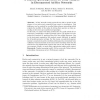Free Online Productivity Tools
i2Speak
i2Symbol
i2OCR
iTex2Img
iWeb2Print
iWeb2Shot
i2Type
iPdf2Split
iPdf2Merge
i2Bopomofo
i2Arabic
i2Style
i2Image
i2PDF
iLatex2Rtf
Sci2ools
127
click to vote
ASMTA
2008
Springer
2008
Springer
A Tandem Queueing Model for Delay Analysis in Disconnected Ad Hoc Networks
Ad hoc network routing protocols may fail to operate in the absence of an end-to-end connection from source to destination. This deficiency can be resolved by so-called delay-tolerant networking which exploits the mobility of the nodes by letting them operate as relays according to the store-carry-and-forward paradigm. In this work, we analyze the delay performance of a small mobile ad hoc network by considering a tandem queueing system. We present an exact packet-level analysis by applying ideas from the polling literature. Due to the state-space expansion, this analysis cannot efficiently be applied for all model parameter settings. For this reason, an analytical approximation is constructed and its excellent performance has extensively been validated. Numerical results on the mean end-to-end delay show that the switch-over time distribution impacts this metric only through its first two moments. Finally, we study delay optimization under power control.
Related Content
| Added | 12 Oct 2010 |
| Updated | 12 Oct 2010 |
| Type | Conference |
| Year | 2008 |
| Where | ASMTA |
| Authors | Ahmad Al Hanbali, Roland de Haan, Richard J. Boucherie, Jan-Kees C. W. van Ommeren |
Comments (0)

